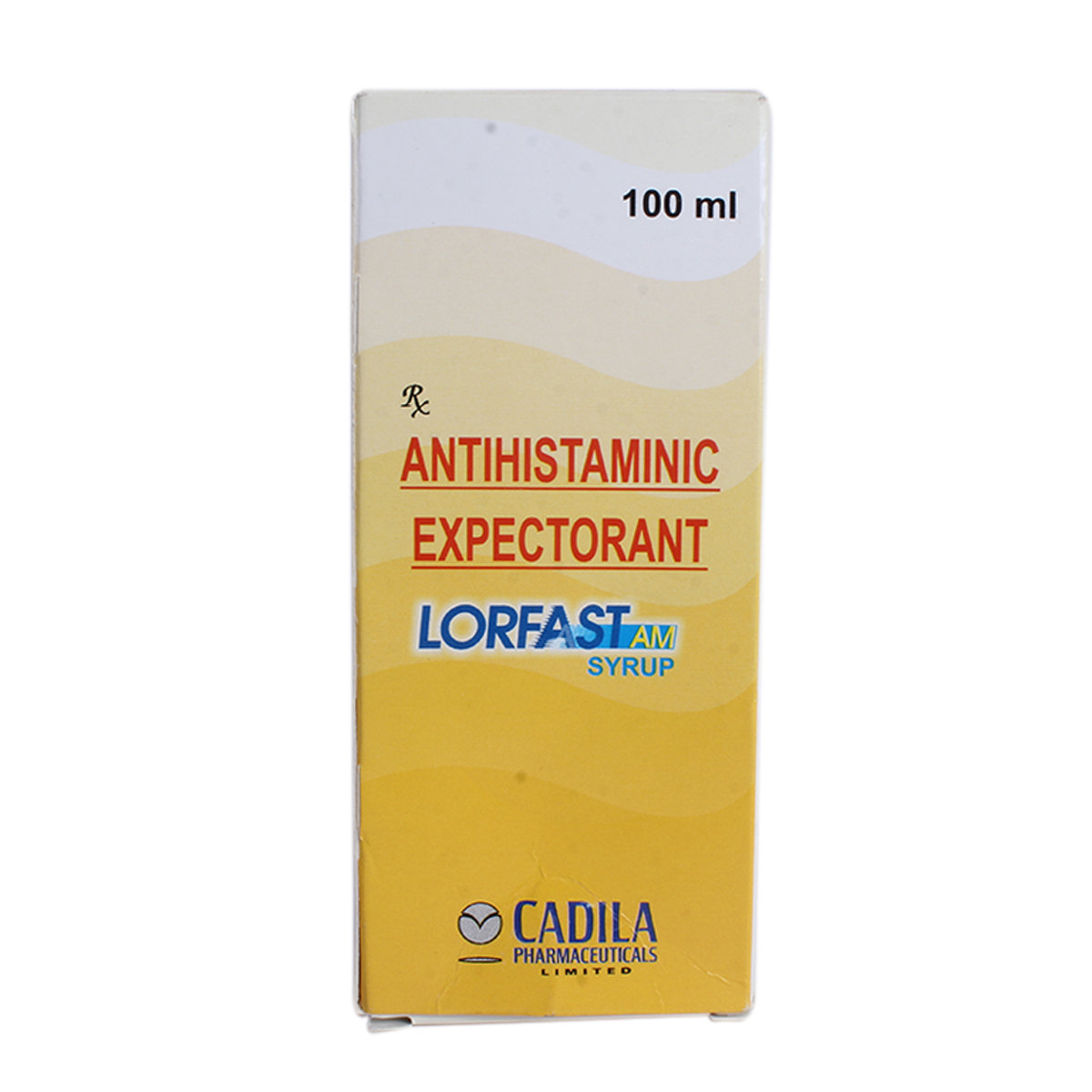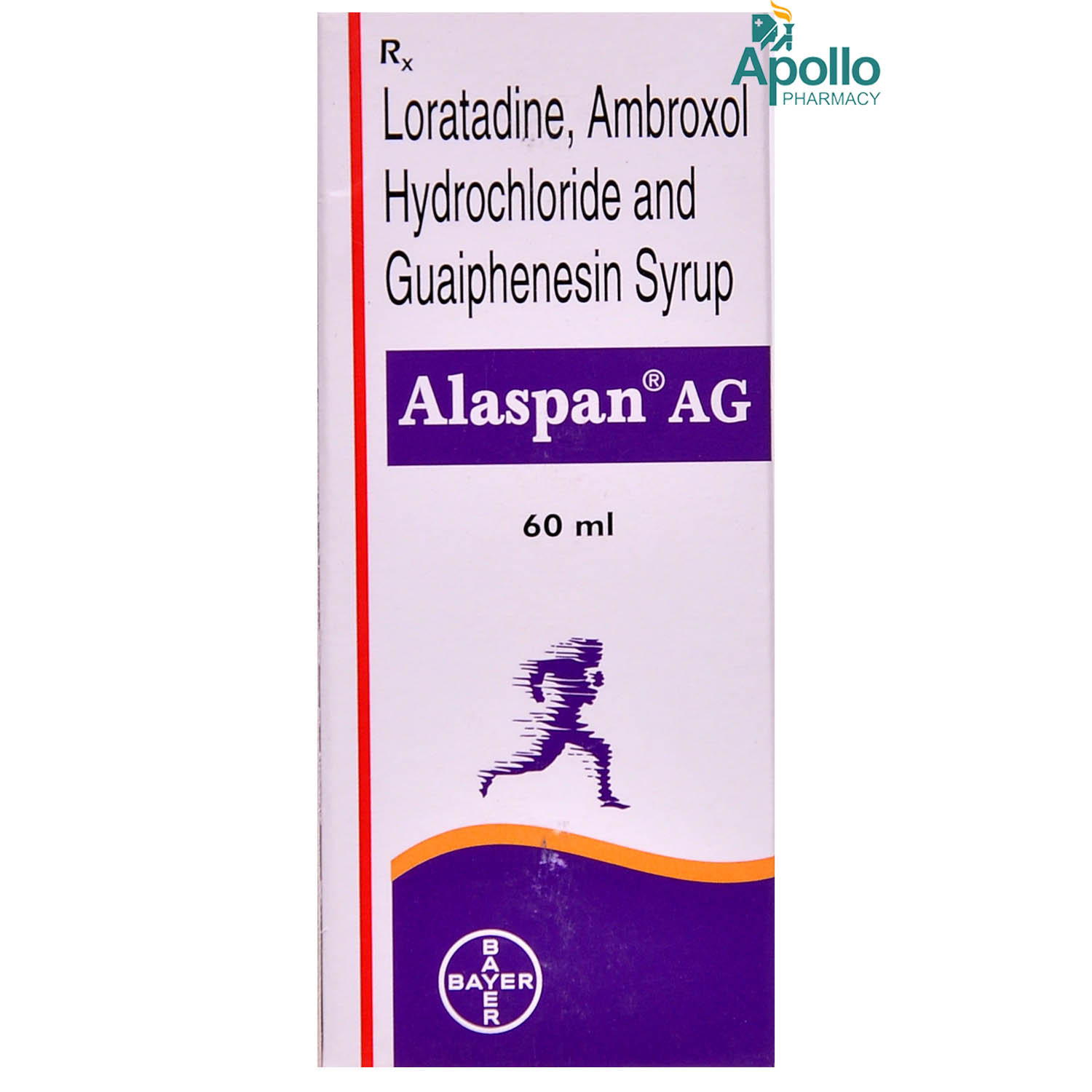Lorfast-Am Syrup 60 ml
MRP ₹148
(Inclusive of all Taxes)
₹22.2 Cashback (15%)
Selected Pack Size:60 ml
60 ml ₹133.2
(₹2.22 per ml)
In Stock
100 ml ₹133.2
(₹1.33 per ml)
In Stock
Provide Delivery Location
Online payment accepted
 Prescription drug
Prescription drugWhats That
Composition :
Manufacturer/Marketer :
Consume Type :
Expires on or after :
Return Policy :
About Lorfast-Am Syrup
Lorfast-Am Syrup belongs to a class of cough and cold preparations primarily used to treat allergic symptoms (like sneezing, watery eyes, runny nose, itchy nose/throat), common cold symptoms, and cough. An allergy is an immune system response to foreign elements typically not harmful to your body. These foreign elements are known as ‘allergens.’ It is also used to induce sleep, treat Parkinson's disease, and relieve cough caused by minor throat or airway irritation.
Lorfast-Am Syrup is a combination drug containing three medicines: Loratadine, ambroxol, and guaifenesin. Loratadine works by blocking the action of histamine, a substance responsible for causing allergic reactions. It directly acts on the brain and relieves symptoms of allergies by preventing the release of histamine. It helps to provide relief from symptoms of allergy such as sneezing, running nose, watery eyes, itching, swelling, and congestion or stiffness. Ambroxol belongs to the class of mucolytic agents (cough/sputum thinner) that work by thinning and loosening phlegm (mucus) in the lungs, windpipe, and nose. Guaifenesin belongs to the class of expectorants that increase the volume of fluid in the airways, reduce the stickiness of mucus, and remove it from the airways.
Take Lorfast-Am Syrup as suggested. The doctor will adjust the dose you are given according to your condition and response to the medicine. In some cases, you may experience nausea, diarrhea, vomiting, stomach pain, dizziness, headache, allergic reaction, and sleepiness. Most of these side effects of Lorfast-Am Syrup do not require medical attention and gradually resolve over time. However, if the side effects are persistent, reach out to your doctor.
Consume only if the doctor prescribes it. Never encourage self-medication or suggest your medicine to someone else. Inform your doctor, before taking Lorfast-Am Syrup, if you have severe liver or kidney problems, peptic or duodenal ulcers. Increase the intake of fluids so that mucus is loosened. Before using Lorfast-Am Syrup, ask doctor if you are taking alcohol, sedatives or tranquilizers as using Lorfast-Am Syrup with recreational drugs might induce drowsiness. It is advisable not to drive any motor vehicle or operate heavy machinery as increased drowsiness and dizziness can occur after taking Lorfast-Am Syrup. If you are pregnant or a nursing mother, ask a doctor before its use. Speak to your doctor if your symptoms do not go away after taking Lorfast-Am Syrup for 5 days. Before using Lorfast-Am Syrup, speak to your doctor if you are breastfeeding a baby or if you are pregnant.
Uses of Lorfast-Am Syrup
Directions for Use
Key Benefits
Lorfast-Am Syrup is a combination drug containing three medicines: Loratadine, ambroxol, and guaifenesin. Lorfast-Am Syrup is primarily used to treat allergic symptoms like sneezing, running nose, watery eyes, itchy nose/throat, common cold, and cough. Loratadine is an antihistamine (anti-allergic drug) that works by blocking the action of histamine, a substance responsible for causing allergic reactions. Thus, it helps provide relief from allergy symptoms such as sneezing/runny nose, red/itchy/watery eyes, throat swelling, itchy throat, and congestion or stiffness. Ambroxol belongs to the class of mucolytic agents (cough/sputum thinner) that work by thinning and loosening phlegm (mucus) in the lungs, windpipe, and nose for coughing out easily. Guaifenesin belongs to the class of expectorants that increase the volume of fluid in the airways, reduce the stickiness of mucus, and remove it from the airways.
Storage
Drug Warnings
If you are taking other antihistamines, please inform your doctor before starting Lorfast-Am Syrup. Increase the intake of fluids so that mucus is loosened. Before using Lorfast-Am Syrup, ask a doctor if you are taking alcohol, sedatives, or tranquilizers, as using Lorfast-Am Syrup with recreational drugs might induce drowsiness. It is advisable not to drive any motor vehicle or operate heavy machinery as increased drowsiness and dizziness can occur after taking Lorfast-Am Syrup. If you are pregnant or a nursing mother, ask a doctor before its use.
Diet & Lifestyle Advise
- Some anti-inflammatory compounds in ginger can relax membranes in the airways, which could reduce coughing.
- Staying hydrated is vital for those with a cough or cold. Drinking liquids at room temperature can alleviate cough, runny nose, and sneezing.
- The main cause of a cough is acid reflux. One of the easiest ways to treat this condition and reduce the cough that accompanies it is to avoid foods that can cause acid reflux.
- The immune system is affected by stress and raises the risk of being sick. An individual can exercise regularly, meditate, do deep breathing, and try progressive muscle relaxation techniques to relieve stress.
- To stay fit and safe, try to sleep 7-9 hours each night.
- Maintain personal hygiene and keep your surroundings clean.
Side Effects of Lorfast-Am Syrup
- Nausea
- Diarrhea
- Vomiting
- Stomach pain
- Dizziness
- Headache
- Sleepiness
Habit Forming
Therapeutic Class
All Substitutes & Brand Comparisons
RX
Out of StockAmbroxin L Syrup Sugar Free
Drakt Pharmaceutical Pvt Ltd
₹55.16
(₹0.5/ 1ml)
77% CHEAPERRX
Out of StockLorfen AM Syrup
Suzikem Drugs Pvt Ltd
₹35
(₹0.53/ 1ml)
76% CHEAPERRX
Out of StockDaslin NF Syrup 60 ml
RPG Life Sciences Ltd
₹43.5
(₹0.65/ 1ml)
70% CHEAPER
FAQs
Drug-Drug Interactions Checker List
- AMOXICILLIN
- CEFUROXIME
- ERYTHROMYCIN
- CODEINE
Special Advise
It is advised to avoid contact with known allergens (allergy-causing agents) such as pollen, dust etc. Certain food items are known to cause allergies to you.
Disease/Condition Glossary
Allergy: It is an immune system response to foreign elements typically not harmful to your body. These foreign elements are known as ‘allergens.’ Allergic condition varies from person to person. Some might be allergic to certain foods and seasonal allergies like hay fever. At the same time, others might be allergic to pollen or pet dander. One of the symptoms of allergy is cough.
Cough: Coughing is the body’s way of clearing irritants (like allergens, mucus, or smoke) from airways and preventing infection. Coughs may be dry or productive. A productive cough (wet cough) brings sputum (phlegm, mucus, and other matter) from the lungs. Cough is commonly caused as a response to allergy or viral infection but coughing up mucus is possibly an indication of infection in the respiratory tract. If you are coughing thick, solid white mucus, you may have a bacterial infection in the airways. If the mucus is clear or light-coloured, you may have allergies or a minor infection in the respiratory tract, and yellow or green mucus indicates a respiratory infection.

Have a query?
Alcohol
Safe if prescribed
Avoid alcohol consumption while taking Lorfast-Am Syrup as it could lead to increased drowsiness, dizziness and liver damage.
Pregnancy
Consult your doctor
Please consult your doctor if you are pregnant, your doctor will prescribe Lorfast-Am Syrup only if the benefits outweigh the risks.
Breast Feeding
Consult your doctor
Lorfast-Am Syrup is known to be excreted in breast milk, so its use while breastfeeding should not be done.
Driving
Safe if prescribed
Lorfast-Am Syrup is known to cause drowsiness and dizziness, so driving a car or operating any machinery which requires concentration should not be done.
Liver
Consult your doctor
Lorfast-Am Syrup to be taken with caution, especially if you have a history of liver diseases/conditions. The dose may have to be adjusted by your doctor.
Kidney
Consult your doctor
Lorfast-Am Syrup to be taken with caution, especially if you have a history of kidney diseases/conditions. The dose may have to be adjusted by your doctor.
Children
Safe if prescribed
Lorfast-Am Syrup should be given to children only if suggested by a child specialist.








